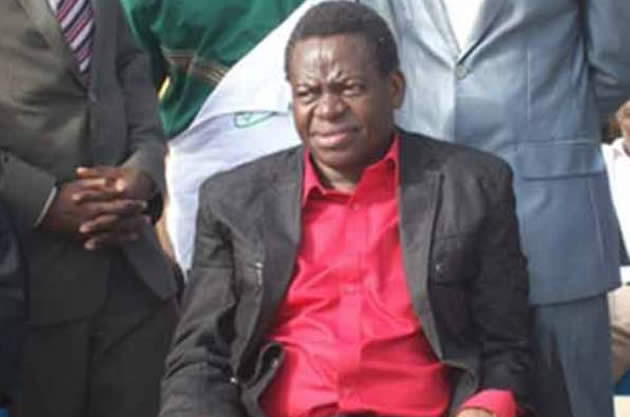Biggie Tembo lost spiritual battle

Stanely Mushava Arts Correspondent
Zimbabwe’s jit heartthrob Biggie Tembo is one of the most internationally acclaimed artists ever to emerge from the country. A few local musicians have achieved Tembo’s cosmopolitan resume since his tragic death at 37 in 1995.
While most artists perform overseas before paltry audiences exclusively composed of the Zimbabwe Diaspora, Bhundu Boys, the band Tembo fronted, performed before 80 000 revellers at the Wembley Stadium in 1987.
At the high tide of the jit sensation, the Bhundu Boys toured Europe, North America, Australia and Hong Kong where they were wildly popular.
The band was not only popular outside the country as the case is with some artists who narrow down their trade for an elite segment.
Their manager Gordon Muir once said when he entered a bank in Harare with Tembo all attention shifted from the money to the “Hatisi Tese” hitmaker.
The band was feted home and abroad for tracks such as “Jekesa Jekanyika,” “Simbimbino,” “Tsvimbo Dzemoto,” “Chekudya Chose” and “Hupenyu Hwangu.”
While making waves across the international arena, Tembo found the sudden perks of a showbiz life hard to process, having come from an impoverished background.
At one time he resisted being chauffeur-driven in a limousine while the band was touring the United States, saying they could not afford such luxury when their brothers and sisters were suffering back home.
A BBC presenter, John Peel, once described the group’s discography as the most naturally flowing music he had ever heard in his life, while his colleague Andy Kershaw called Bhundu Boys one of the greatest pop groups he had ever heard.
Tembo bagged a Sony Award for a BBC documentary that he co-presented with Kershaw, who was also the best man at his wedding with Ratidzai.
“To call the Bhundu Boys one of the greatest African bands of all time is to demean their achievement; their unique talent never required a geographical prefix,” wrote Independent (UK)’s Robert Chalmers.
Tembo’s admirers included Pastor Charles Charamba, whom he encouraged to record when the two met at a Christian college as the budding psalmist was struggling to find his feet in the industry.
Charamba returned the favour by donating instruments to Tembo’s son Biggie Tembo Jr, to help him consolidate his own career.
At the time of his death, Tembo was contemplating ditching music for a pastoral vocation. Tragically, Tembo hanged himself in a ward of a psychiatric hospital in Harare on July 30, 1995.
In the days leading to his death, he once appeared on television confessing that he had demons. While in the UK he had been quoted as saying: “It was because spiritually I was losing the battle like everyone else.
“So much that I ended up in the psychiatric unit of a hospital in Bristol at one stage. I was under so much stress I could not cope.”
While on the mend, he took to preaching and speaking in tongues on public transport, but his dark side was to prevail and end his life prematurely.
Three of the Bhundu Boys Shakie Kangwena, David Mankaba and Shepherd Munyama died before Tembo’s suicide.
Ratidzai lamented that for all their success the Bhundu Boys were now synonymous with dying of AIDS more than anything else.
Although a posthumous compilation of Bhundu Boys’ early hits, Shed Sessions, sold well internationally, his impoverished family was swindled out of the proceeds, with Muir and their first Zimbabwean manager Steve Roskilly trading the blame.
The founding of Bhundu Boys coincided with Zimbabwe’s Independence in 1980.
They were invited to the UK in 1986 by a label called Disafrique. Muir bankrolled the band’s early tours in UK before they soon rose to international acclaim.
The band was soon signed by WEA and switched producers. Their first album under the label had a Westernised feel which alienated some of their early admirers.
The trademark mbira sound transposed through the guitar was replaced by laboured sophistication in the album.
Things fell apart when Tembo fell out with Muir and was sacked from the band. His solo projects flopped and attempts at stand-up comedy little salvaged his former popularity.
The band, in turn, was dealt a death-knell, without Tembo’s endearing, charismatic stage persona.
While still struggling with his scuttled fortunes, Tembo suffered yet another blow. He learnt that the man who had raised him was not his actual father.
The double-barrelled crisis took a heavy toll on him and he ended up taking bizarre rituals, involving snuff and the invocation of ancestral spirits.
He soon became mentally disturbed and was admitted to mental institutions in Bristol and Harare.
Bhundu Boys later disbanded and the large house they had purchased in London was sold and the money split between the remaining members.
Surviving Bhundu Boys member, Rise Kagona, claims he got a pittance from the sale of the property. Tembo family got virtually nothing for his part in the jit legacy.










Comments